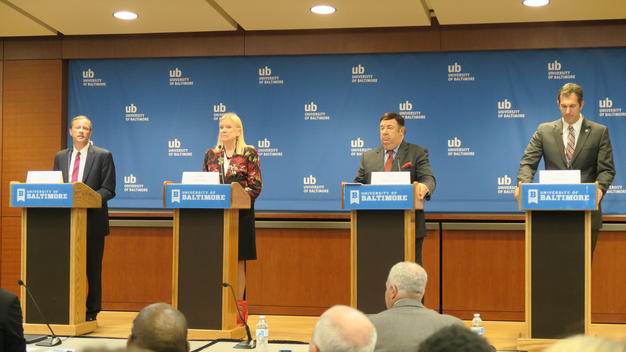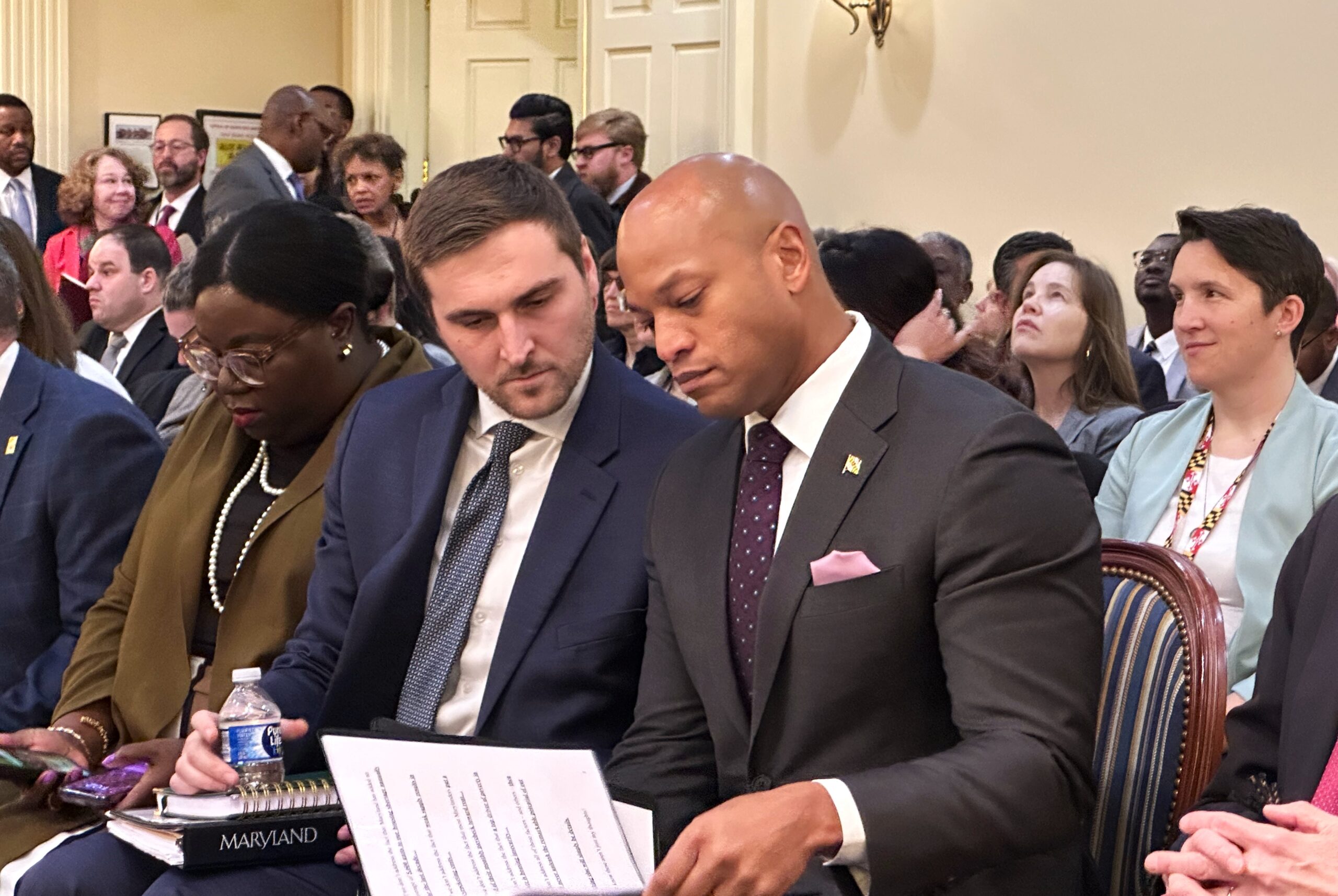‘Pay to Play’ Gets Lots of Play in Baltimore County Executive Forum
Across dozens of forums for Democratic Baltimore County executive candidates, no matter the subject — affordable housing, overcrowded schools, expanding the tax base — the discourse this year always seems to eventually drift back to developer influence.
It started earlier this year with state Sen. James Brochin, 54, a four-term legislator, who targeted what he called “pay-to-play” politics in the county and managed to make it his campaign mantra.
Eventually, John A. “Johnny O” Olszewski Jr., 35, a former member of the Maryland House of Delegates who bills himself as the education candidate, started talking more frequently about putting an end to the pull of “special interests” in the county.
Finally, even County Councilwoman Vicki L. Almond, 69, who has represented the 2nd District since 2010, referenced “pay-to-play” activities Wednesday, in an unsolicited defense.

Four of the five leading candidates for Baltimore County executive at a forum Wednesday. Photo by William F. Zorzi.
“There is not a pay-to-play system, and I do not like that term, and it is just not a term that is something that I will put up with any more,” Almond said in her opening statement of a televised forum.
Her remarks followed Brochin kicking off the debate by telling viewers that developer influence was one of the reasons he was in the race.
“I’m running for county executive because I want to stop pay-to-play politics in Baltimore County,” he said. “We have a system where … certain members of the County Council get campaign contributions from developers and developer interests, and then they get unfettered access to our lands.”
The hour-long forum was cosponsored by The Baltimore Sun, WJZ-TV, the CBS affiliate in Baltimore, and the University of Baltimore Schaefer Center for Public Policy.
While Brochin did not link the practice to Almond, he and Olszewski have suggested in past forums and debates that she is partial to developer interests, citing her County Council votes as evidence.
Republican Patrick L. McDonough, 74, a current member of the House and a radio talk show host on WCBM-AM, said he agreed with Brochin that “there is that powerful influence by certain developers,” but then launched into a rambling explanation of his plans for the county.
The other Republican candidate, Alfred W. Redmer Jr., 62, a onetime House member and the Maryland insurance commissioner who is being backed by GOP Gov. Lawrence J. Hogan Jr., was unable to attend the forum because his wife had a surgical procedure.
Of course, other issues were discussed.
Concerned about the opioid epidemic, Brochin said he wants to pursue a pilot program for on-demand drug treatment, based on Anne Arundel County’s “Safe Stations” initiative, in which addicts can walk into any police or fire station in the county and get immediate help.
Olszewski said he would hold County Council work sessions in the evenings, instead of during the day; schedule budget hearings around the county; and initiate “cabinet in the community” meetings, bringing administration officials out to the neighborhoods.
Calling education the “cornerstone to my campaign,” he said he is a proponent of universal pre-kindergarten, free community college for students and raising the minimum wage.
Almond said she “would protect our children, our families and our seniors”; create opportunities for small businesses and for students not going to college. In the latter case, she would work to put training programs for skilled trades back into the school system and community colleges. Finally, she said, she would improve “customer service” to taxpayers.
In short, McDonough said he wanted to revamp the entirety of county government.
“Baltimore County is like a runaway train coming off a bridge,” McDonough said.
“The candidates up here today are all qualified people, they’re all good people,” he said. “I say that I’m different because they want to slow that train down; I want to stop that train — and I think the people of Baltimore County want that train stopped.”
Sooner or later, though, the question of developers again raised its ugly head.
Olszewski said he wants to take money out of politics and is proposing a public finance campaign system, similar to an option available for Maryland gubernatorial elections.
Brochin would like to see a limit on campaign contributions to elected officials who are considering development projects, similar to legislation he proposed in the past, but which failed.
“If development is such a good idea, let’s take campaign contributions out of it,” he said.
Under legislation he proposed in 2017, if developers have a project in a specific councilmanic district, “you may not give a campaign contribution to that councilperson or the county executive in the preceding three years,” Brochin said.
“If you do, you have to give it back,” he said. “So, development projects will have to be based on their merit.”
Brochin’s proposal is based on a similar law in Prince George’s County that was pushed through the General Assembly by Senate President Thomas V. Mike Miller (D) in 1992. That legislation, many believed at the time, was aimed at a then-political adversary of Miller’s — former Prince George’s County Executive Parris N. Glendening (D), whose campaigns had benefited handsomely over the years from developers’ largesse. Glendening went on to become a two-term governor.
Almond, however, took issue with the suggestion that something was wrong with things as they are.
“Baltimore County is not corrupt. The Council is not corrupt. We do not take money for developers for anything — for pay-to-play, for anything,” she said.
“And I have to say for most people on this stage have taken money from developers, from community people, from special interest groups, but it doesn’t mean you’re giving something back,” Almond said.
“It just means they want to see you elected to the office, because they know you’re fair, because they know you will work with them, communicate with them,” she said. “It’s all about those relationships and those partnerships.”
Among a very few audience members was James T. Smith Jr., a former two-term Baltimore County executive, who was there to see Almond, his pick in the race.
Smith, now “chief of strategic alliances” for Baltimore Mayor Catherine E. Pugh, is also a former Baltimore County councilman and circuit judge. After his two terms as executive, he was appointed by then-Gov. Martin J. O’Malley as Maryland’s secretary of transportation, a post in which he served from July 2013 until January 2015.
Asking questions of the candidates Wednesday were Mary Bubala of WJZ, Andrew A. Green, opinion editor of The Sun, and P. Ann Cotten, director of the Schaefer Center.




 Creative Commons Attribution
Creative Commons Attribution